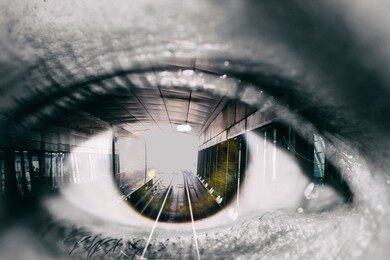Tunnel Vision Symptoms
There are several types of eye diseases that may lead to tunnel vision, including glaucoma and retinal detachment. Tunnel vision is the loss of peripheral vision.
A description of the symptoms associated with tunnel vision is presented in this article, along with possible causes and treatment options.
The symptoms of Tunnel Vision
As a result of tunnel vision, your peripheral vision is affected. You may have difficulty seeing or won’t be able to see objects outside of your central field of vision if you suffer from tunnel vision. You may experience difficulty driving or navigating through a crowd if you suffer from tunnel vision.
As well as tunnel vision, there are other symptoms that you may experience that will depend on the cause of the condition. These symptoms may include other types of vision loss (such as loss of central vision) as well as difficulty seeing in low light conditions.
Similarly, tunnel vision can occur without any other symptoms, such as, for example, glaucoma, one of the most common causes of tunnel vision.
The causes of Tunnel Vision
There are several causes of tunnel vision, including glaucoma, retinal detachment, and retinitis pigmentosa.
Glaucoma
Several factors contribute to glaucoma, including increased eye pressure and increased risk of vision loss. Although no symptoms can be observed in glaucoma, one description of vision loss is “looking through a straw.”
Retinal Detachment
An eye that has detached from its retina, a light-sensitive tissue, is referred to as having a retinal detachment. A gray curtain may move across your field of vision or a shadow may appear in your side vision as a result of this. You may experience sudden blurry vision, floaters and flashes in your field of vision.
Retinitis Pigmentosa (RP)
RP is a rare genetic disease that causes retinal damage and alters the way the retina responds to light. The course of RP depends on your genetic type: It usually begins at a young age, and by middle age, you begin experiencing vision loss. A person with vision loss usually begins with poor night vision, progresses to loss of side vision (leading to tunnel vision), and eventually loses his or her central vision.
Other Causes
There are several other causes of tunnel vision, including:
-
Migraine
-
Optic neuritis, or an inflammation of the fibers that send messages to the brain
-
Stroke
-
Brain trauma
-
A tumor
-
Anxiety
How to Treat Tunnel Vision
In order to treat tunnel vision, it is necessary to determine its underlying cause.
Medicated eye drops can be prescribed by an eye doctor for the treatment of glaucoma in order to help lower eye pressure. Although these medications cannot reverse vision loss already occurring, they can be used to prevent further damage to vision. Glaucoma can also be treated with surgery to slow down further vision loss.
It is possible to repair tears or holes in the retina with laser (photocoagulation) or freeze (cryopexy) treatments. For retinal detachment, surgery is necessary. Some of the surgeries used include:
-
The Pneumatic Retinopexy procedure involves the injection of a gas bubble into the eye that will force the retina into place. Eventually, your eye will make fluid that will replace the gas bubble, and the gas bubble can then be removed.
-
The Scleral Buckle is a device that works by attaching a rubberized or soft plastic band around the eye, defying the force that causes the retina to move.
-
In Vitrectomy, a bubble of air, gas, or oil is used to replace the vitreous (clear fluid that fills the eye). This bubble helps to move the retina into position to heal the retina.
In spite of the fact that researchers are attempting to find effective treatments for RP, there is no definitive treatment. The RPE65 gene leads to a form of RP that can be treated with a type of medication injected into the eye, voretigene neparvovec-rzyl. This medication is injected into the eye during a vitrectomy.
Tunnel Vision: Risk Factors and Complications
Untreated glaucoma or retinal detachment can cause further vision loss or blindness without treatment, which is the most common complication associated with leading causes of tunnel vision. Although most forms of retinitis pigmentosa cannot be prevented from losing vision, the disease will not result in total blindness.
Are There Tests to Diagnose the Cause of Tunnel Vision?
In order to determine the cause of tunnel vision, a thorough eye examination is important. One of the most commonly performed tests by an eye doctor is a dilated eye exam. During a dilated eye exam, an eye doctor will apply drops to your eyes to expand your pupils. As a result, it is easier to observe the back of the eye for signs of glaucoma or retinal detachment.
To determine the cause of tunnel vision, an eye doctor may perform the following tests:
-
Visual field test: Measures your side vision
-
Optical coherence tomography: A type of imaging that uses light waves to take pictures of your retina
-
Ultrasound: Views your retina
-
Tonometry: Measures the pressure in your eye
Your provider will determine the exact tests to be performed based on what he or she suspects is causing your tunnel vision.
When to See a Healthcare Provider
The first step to ensuring that you are not experiencing sudden, new tunnel vision is to consult an eye doctor or go to the emergency room if an eye doctor is not available. This will allow you to rule out the possibility of a retinal detachment, which is an urgent matter.
You should consult an eye doctor if you experience gradual tunnel vision over a period of several weeks.
Summary
There are a number of reasons behind tunnel vision, including glaucoma, retinal detachment, and retinitis pigmentosa. Tunnel vision may be your only symptom, but you may also experience other changes or have difficulty seeing in low light.
It is possible to determine what is causing tunnel vision during a comprehensive eye examination by performing various tests. Various treatments are available in order to prevent further vision loss.
















